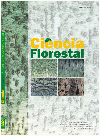
|
Ciência Florestal
Centro de Pesquisas Florestais - CEPEF, Departamento de Ciências Florestais - DCFL, Programa de Pós Graduação em Engenharia Florestal - PPGEF
ISSN: 0103-9954
EISSN: 0103-9954
Vol. 24, No. 4, 2014, pp. 923-932
|
 Bioline Code: cf14087
Bioline Code: cf14087
Full paper language: English
Document type: Research Article
Document available free of charge
|
|
|
Ciência Florestal, Vol. 24, No. 4, 2014, pp. 923-932
| pt |
ESTIMATIVAS DO ÍNDICE DE ÁREA FOLIAR UTILIZANDO O LAI-2000 E FOTOGRAFIAS HEMISFÉRICAS EM PLANTIOS DE EUCALIPTO
Rody, Yhasmin Paiva; Ribeiro, Aristides; Pezzopane, José Eduardo Macedo; Gleriani, José Marinaldo; Almeida, André Quintão & Leite, Fernando Palha
Resumo
O objetivo deste estudo foi estimar o Índice de Área Foliar (IAF) por métodos indiretos em plantios
clonais de eucalipto em dois distintos sítios físico-climáticos, durante as estações seca e chuvosa. O estudo
foi feito em quatro talhões, dois jovens e dois adultos, localizado na bacia do Rio Doce, leste de Minas
Gerais, situados em áreas de baixas e altas altitudes. Nove parcelas foram alocadas em cada talhão. Dados
experimentais foram coletados em períodos secos e chuvosos. As medidas indiretas do IAF foram feitas
usando o LAI-2000 e câmeras com lentes hemisféricas. Para verificar a precisão da estimativa foi realizada
a análise destrutiva. As medias do LAI-2000 foram aquelas que melhores correlacionaram com os dados
de IAF observados (R=0,9), embora as fotos hemisféricas apresentem bom potencial de uso. Foi verificado que os valores de IAF dos talhões de maiores altitudes foram maiores comparados às regiões baixas, o que
também foi observado pelos métodos indiretos. A análise destrutiva indica baixos valores de IAF medidos
na época seca, embora esta variação seja significativamente somente nos talhões das regiões mais altas. Este
comportamento é também observado nas estimativas do LAI-2000, diferente das fotografias hemisféricas
que não identificaram a sazonalidade do LAI.
Palavras-chave
dossel florestal; métodos indiretos; clones; altitude
|
| |
| en |
ESTIMATES OF THE LEAF AREA INDEX (LAI) USING LAI-2000 AND HEMISPHERICAL PHOTOS IN Eucalyptus PLANTATIONS
Rody, Yhasmin Paiva; Ribeiro, Aristides; Pezzopane, José Eduardo Macedo; Gleriani, José Marinaldo; Almeida, André Quintão & Leite, Fernando Palha
Abstract
The objective of this study was to estimate the Leaf Area Index (LAI) by indirect methods in plantations
of Eucalyptus clones in two distinct physical-climatic sites, during the dry and rainy periods. The study
was performed in four young and adult Eucalyptus stands, located in Rio Doce basin, eastern Minas Gerais
state (Brazil) situated in areas of lower and higher altitudes. Nine plots were allocated in each stand.
Experimental data were collected in months representing the driest and the wettest periods. LAI indirect
measurements were performed using the LAI-2000 equipment and cameras with hemispherical lens. To
verify the accuracy of estimation, a destructive analysis was also performed. The LAI measurements by the
LAI-2000 was the one which best correlated with the observed LAI (R =0.90), although the hemispherical
photos had presented good potential use. It is verified that the LAI of stands in the higher altitudes region,
surpassed those of lower altitudes, which was also observed by the indirect methods. The destructive
analysis indicates lower values of LAI measured in the dry season although this variation is only significant
for higher altitudes. This behavior is also observed for estimates with the LAI-2000, different from the
hemispherical photographs which did not identify seasonality of LAI.
Keywords
forest canopy; indirect methods; clones; altitude
|
| |
© Copyright 2014 - Ciência Florestal
Alternative site location: http://cascavel.ufsm.br/revistas/ojs-2.2.2/index.php/cienciaflorestal/index
|
|
